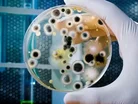Can this Newly Discovered Antibiotic Kill the Most Dangerous Superbugs?

Antibiotic resistance is spreading faster than the introduction of new compounds into clinical practice, threatening the evolution of health care.
Thanks to a recent discovery by researchers, however, we may be able to worry a little less.
Scientists have made a major health breakthrough with the discovery of a new type of antibiotic that seems to be better than existing drugs. And it was found in a pile of soil.
Scientists have found that a soil bacterium, Eleftheria terrae, produces a new antibiotic agent which can kill off pathogens that have long been resistant to other antibiotics. The experimental antibiotic, called teixobactin, marks the launch of a new class of antibiotics and is being recognized as a “game changer.”
Discovered by researchers from Germany, Great Britain and the U.S., it is the first time in 25 years that a major antibiotic discovery has been made. Findings were outlined in the science journal Nature.
[READ MORE] TOP 10: Innovative Pharma Companies to Watch in 2015
But beyond the discovery of the drug, an even more remarkable note to take from the findings is the technology that was developed by the researchers.

iChip Technology
Ninety-nine percent of potential antibiotics cannot be grown in a laboratory, and so researchers developed the device iChip to isolate antibiotic compounds in their natural environment: soil.
To make the iChip work, a sample of soil is diluted and then poured onto the device, which consists of hundreds of small holes. Because of the dilution, it is hoped that only one microbe is caught in each hole.
Covered with membranes on both sides and placed back in the soil sample, the membranes contain pores that are only large enough for chemical nutrients to flow in but small enough to block the movement of any bacteria.
It has been shown that this method can help nearly one in two bacteria to start growing in the iChip cells, and that three-quarters of the iChip bacteria can then be transferred to and grown in lab solutions.
A Multi-Talented Antibiotic
The newly discovered antibiotic works on a broad spectrum of pathogens, and kills bacteria in a slightly different way from previous medications. It attacks the cell wall of bacteria just like other antibiotics, but it does not use a single mechanism to damage the cell wall’s structure. Rather, it attacks different spots, in different ways, according to Tanja Schneider from the University of Bonn.
[READ MORE] This Promising Drug Could Finally Destroy Malaria Once and For All
To keep up with the multiple attacks, bacteria would have to change in multiple, precise ways to become resistant. And while it sounds unlikely, it is not impossible for pathogens to find a way in a few years or decades.

Limited Testing
The new antibiotic has only been tested on mice so far, but with promising results. Scneider noted in the study that “antibiotics with new modes of action are a breakthrough for science.”
The chances of teixobactin becoming a drug suitable for humans is currently hard to estimate, but the odds of drug candidates that work in mice making it through in clinical trials are generally slim. Still, the antibiotic could be chemically modified to make it successful in humans, as well.
Even if teixobactin does not prove suitable for humans, the new cultivation method with iChip should allow many new candidates for antibiotics to become available for future testing.
Follow us on Twitter (@HealthcareGlbl) and like us on Facebook!
